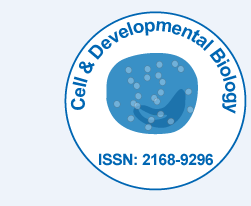
செல் & வளர்ச்சி உயிரியல்
திறந்த அணுகல்
ஐ.எஸ்.எஸ்.என்: 2168-9296

ஐ.எஸ்.எஸ்.என்: 2168-9296
Demet Erdag*, Serkan N. Koc, M. Faruk Oksuzomer, Leman Yalcintepe
Naturel and non-cytotoxic porous scaffolds were obtained with poly(vinyl alcohol) (PVA) and gelatin (GE) using electrospinning and freze/drying methods. Electrospinning scaffolds were produced as PVA/GE/GA crosslinked with glutaraldehyde (GA) and freeze/drying scaffolds crosslinked with genipin (GP) were divided into two groups as PVA/GE/GP5 and PVA/GE/GP8, respectively, according to their genipin ratio. In addition, the main biological significants of genipin is anti-cancer; antibacterial; anti-inflammatuar; antidiabetic; antithrombotic. Selenium is known to increase the proliferation of cells and for its antibacterial properties. The scaffolds were investigated in terms of pore morphology, swell ratio, biodegradation, and biocompatibility. The biocompatibility of the material was tested in vitro by MTT assay on days 1, 2, and 3 to test the cell viability of mouse 3T3 fibroblast cells. Although selenium has both antibacterial and cell proliferation effects, it has not yet been widely used in tissue engineering applications. In this study, for the first time synergistic effect of genipin and selenium was observed for 3T3 cells. This is significant because selenium with PVA/GE scaffolds can be a promising candidate for wound healing application, as it significantly increases cell viability on scaffolds. It is thought that the synergistic effect of selenium with genipin may be an important step in tissue engineering applications.